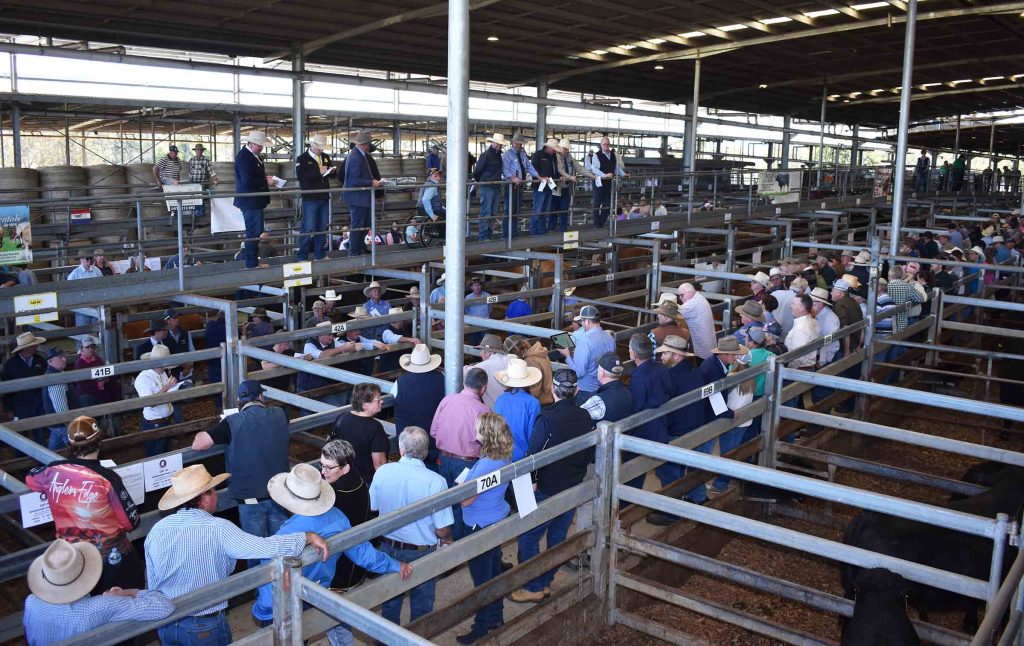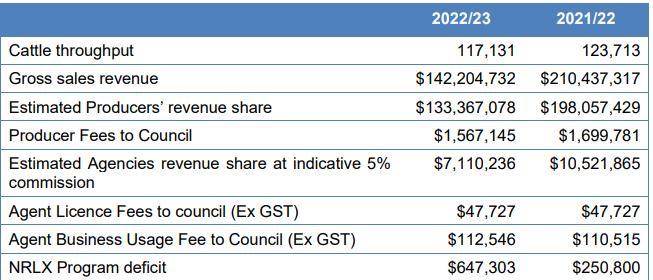
Susanna Freymark
The financial report for the Northern Rivers Livestock Exchange was tabled in the Richmond Valley Council meeting on Tuesday, August 15.
The report showed the NRLX operated at a deficit of $647,303 this financial year, an increase from a deficit of $250,800 the previous year.
The number of cattle through the saleyards in 2022-23 was 117,131 – down on the previous year’s 123,713 head.
The money council received from agent licence fees in each year was $47,727. The Agent Business Usage Fee to council was $112,546 in 2022-23 and $110,515 in 2021-22.
The council received $1,567,145 in producer fees in 2022-23.
The report showed that the gross value of sales was $142,204,732. Of this, $7,110,236 went to agents.
The gross value of sales was down because of fewer cattle and lower prices.
The operating expenses (wages, electricity etc) came to $2,346,824 – about $300,000 more than the previous year. This was because of an increase in the number of sales – with two sales each week for 48 weeks.

“Compared to last year, materials and contracts have seen a significant uplift of $200,000 in expenditure. Included in this figure are contract operations staff costs, repairs and maintenance on grounds, buildings and equipment, effluent and environmental management, soft floor maintenance and replacement, truck wash expenses, weed control and vegetation management,” the report said.
The NRLX had 38 cattle valued at $57,630 on June 30. Having a permanent herd of livestock assists in controlling maintenance costs across the 44 hectare site, the report said.
At the meeting, council general manager Vaughan Macdonald said the market value of the NRLX was $28.5million.
Running a saleyard meant meeting Environmental Protection Agency guidelines and the requirements of an environmental pollution licence.
At least $5million was needed to redo the effluent pond system at the NRLX, Mr Macdonald said.
“Pond heights were damaged in the floods and through 35 years of use,” he said.
“EPA has put in place a pollution reduction program.
“We have to do desludging work and fix the ponds.”
Mr Macdonald said stormwater runs next to the ponds and makes its way into the Richmond River.
There were two choices, he said.
“Grant funding or funding in our own NRLX program,” he said.
“It is a requirement and we must report back on this in December this year.”
Mayor Robert Mustow said over the years, the NRLX had built up reserves to fund things like the ponds.
“It is unfortunate that over the years, the fees have not been enough to do that,” he said.
The reserve sits at a “couple of hundred thousand”.

A new licence agreement offered to agents included a fee increase.
The agents have refused to sign the agreement and the NRLX has been closed since July 1 except for the Casino All Breeds Sale.
The agents have not commented on the council’s NRLX report. They released a statement on August 1.
IndyNR.com continues to offer an interview invitation to agents and the council to discuss the ongoing dispute.
A closed saleyard in Casino is not good for council, agents, farmers or the community.
Other options for the NRLX were discussed later in the meeting. Read about that here.



